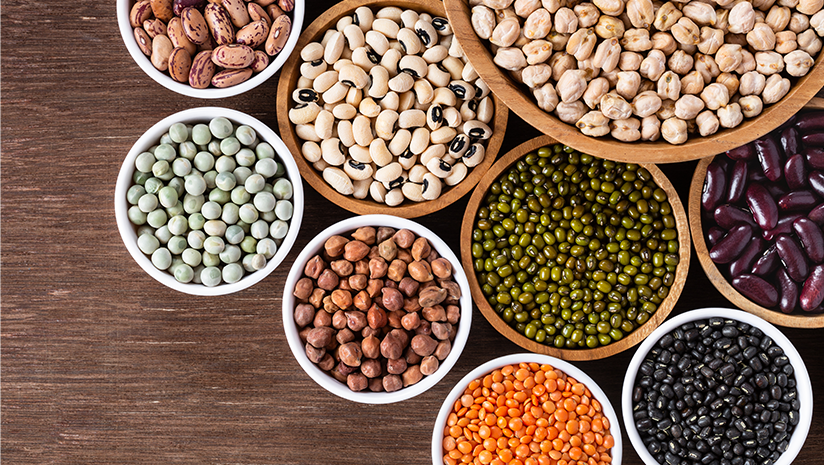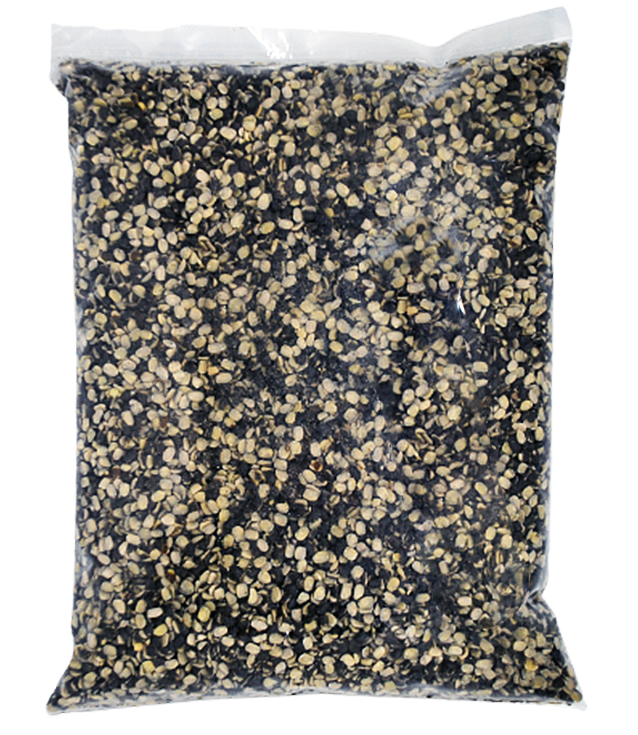Best organic dal

As the term suggests, organic dal is an eco-friendly dal harvested using natural processes. This includes natural irrigation, natural compost, and natural fertilizers as well. So you can expect a chemical-free dal that uses hand-milling methods to retain the nutrients and taste of the food.
Here are some organic daal product details.

Mass Dal is alternatively known as vigna mungo, black gram, urad bean, minapa pappu, mungo bean, or black matpe bean. It contains high levels of protein, potassium, calcium, iron, niacin, thiamin, and riboflavin with a surprising number of health benefits.
It helps to boost immunity power, protect from heart diseases, reduce pain and inflammation, keep your skin healthy, prevent diabetes, build strong bones, strengthen the nervous system, and optimize digestion.It is both, consumed by cooking and used in Ayurvedic medicine, and is equally beneficial when used either way. It offers a ton of health benefits.
Benefits
1. It boosts your energy
As black grams contain very high levels of iron, they are really good at increasing the overall energy levels in your body. Iron is an extremely important nutrient for your body as it stimulates the production of red blood cells. These cells are responsible for carrying oxygen to all your organs.
2. It boosts bone mineral density
Black grams are filled with important minerals such as magnesium, iron, potassium, phosphorus, and calcium. All of these play a crucial role in affecting your bone mineral density. This is extremely important because as we age, our bones become weaker, making us more susceptible to breaking bones and osteoporosis. Maintaining a diet that has high amounts of minerals can help you maintain bone health.
3. Its good for diabetics
If you have diabetes, maintaining your diet is one of the most important things that you can do as it is the only thing that will monitor and control the disease. High fiber foods are often recommended to diabetics as it helps by regulating the amount of nutrients that’s absorbed by the digestive tract. As a result, it can help you maintain your blood sugar and glucose levels, making your diabetes much more manageable. It prevents dramatic drops and spikes in the sugar levels as well.
4. Its good for your skin
Black gram is used in almost every ayurvedic remedy that’s related to your skin. As it is extremely rich in minerals and vitamins, it is great for reducing any inflammation on your skin. It can also help get rid of marks and spots, bring more oxygenated blood towards your skin to make it look radiant and glowing, and also helps with healing and exfoliating your skin. Furthermore, black gram can help you get rid of tans, heal sunburns, and lessen your acne. On the whole, this bean is extremely good for your skin.
5. It reduces pain
Black gram is widely used in order to relieve people from pain and inflammation. It is widely used in Ayurvedic remedies for the same. It has large amounts of vitamins and minerals, and can boost your metabolism. It helps decrease oxidative stress as well. A paste made of black gram can be applied topically to your aching joints and muscles for relief.
6. It is good for your heart
Black gram is also extremely good for your heart health. As it has high quantities of fiber, magnesium, and potassium, it is known to provide multiple benefits that can keep your cardiovascular system healthy. It can balance out your cholesterol, which is extremely good for your heart. It can also prevent artherosclerosis.
Potassium is known to reduce tension in the arteries and veins, lowering your blood pressure significantly. The magnesium present in black grams can help stimulate your blood circulation, bringing more oxygen to all your organs. As a result, with all these effects, your cardiovascular system remains healthy.
7. It is a diuretic
Another advantage of black grams is that it is a diuretic which means that it stimulations urination. As a result, your body can get rid of harmful toxins, ureic acid, excess water, excess fat, and even calcium stored in the kidneys. As a result it can prevent kidney stones from occurring.

Gahat Daal(Horse Gram)
Gahat is one of the many varieties of daal found in Nepal. Mostly found in the Terai region, it is commonly called kurti in some part of Nepal while it is known as gahat in other places. Especially during the winter season, people in Nepal prefer eating this daal as it is said to keep the chills at bay.
It also has important health benefit as it is said that this lentil could dissolve the stone problem in abdomen, known as pathari rog.However, this lentil is avoided during summer or hot and warm days as it is said the lentil might have adverse effects if consumed during summers. Hence, with the arrival of winter in Nepal, the popularity of the lentil also increases and it is prepared in almost every Nepali household at least once, during the winters.
Benefits
1 Insulin Resistance
It is found that unprocessed, raw horse gram seeds have the ability to reduce high blood sugar following a meal, by slowing down carbohydrate digestion and reducing insulin resistance by inhibiting protein-tyrosine phosphatase . This makes it an extra diabetic-friendly food.
2 Full of Antioxidants
Horse gram seeds are rich in polyphenols, flavonoids and proteins – the major antioxidants present in fruits that makes them so healthy.
3 Helps Urinary Discharge
In Ayurveda, horse gram is a well-known diuretic and is reputed to be effective in increasing urine flow. For this purpose, horse gram can soup can be consumed twice a day for four weeks to show visible results.
4 Prevents Kidney Stones
Due to its diuretic properties, horse gram is very effective in assisting in the removal of kidney stones. In addition, making horse gram a part of your regular diet will aid in avoiding the formation of stones in the kidneys, as horse gram contains certain compounds that make these stones soluble.
5 Heals Ulcers
Lipids in horse gram have been shown to have anti-ulcer activity due to the presence of phytosterol esters. Researchers from the Department of Surgery at Royal Free and University College Medical School, London found that horse gram is highly beneficial in healing peptic and mouth ulcers.
6 Asthma Relief
A common Ayurvedic prescription for asthmatic patients is to consume the paste of boiled horse gram and pepper, which aids in reducing cough, cold and congestion. Although not a cure for asthma, it has been known to provide immediate relief and help manage breathing problems.
7 Best for Heart Disease
According to established medical science, oxidative damage caused by free radicals plays a causative role in ageing and leads to diseases including several heart diseases. However, the human body is capable of minimizing this damage with the right nutrients and antioxidants. Raw horse gram is particularly rich in polyphenols, flavonoids and proteins, the major antioxidants. It is also low in fat and high in carbohydrate content, making it healthier for the heart.
8 Good for Weight Loss
Eating plenty of horse gram can actually help in the management of obesity as it has the ability to attack fatty tissue, thanks to its high phenol content.
9 Keeps You Warm in Winter
Horse gram – especially in the form of soup – has the ability to generate heat and energy in the system and therefore keeps you warm on a cold winter day.
10 Good for the Bones
Horse gram is high in iron, calcium, and protein. In fact, horse gram has the highest calcium content among pulses and is one of the richest vegetarian sources of protein.
11 Controls Menstrual Problems
Horse gram contains iron in high levels, which helps to cure irregular menstrual cycles. It also increases your blood hemoglobin due to its high iron content.

MASOOR DAL
Masoor Dal, known as Lentil in English, is one of the most ancient legume crops. It has high nutritional value as it is a rich source of protein, fiber and minerals and has low-fat content.
Benefits
1. Masoor Dal is beneficial for the skin
As it keeps the skin moisturized and healthy due to the presence of vitamin B. It also helps in managing acne as it is a good source of zinc and has anti-inflammatory properties. Applying a face pack made of Masoor Dal powder along with milk or honey on the face acts as a natural scrub and helps in managing facial hair.
2. Incorporated into the diet.
It reduces the risk of heart disease by lowering blood pressure and cholesterol levels due to the presence of dietary fiber, protein, and antioxidants. It is also beneficial in pregnancy and helps in fetal development due to the presence of iron and folate. It can be consumed in the form of Dal (curry), soup.
3. Best for Diarrhea control
Masoor Dal helps manage diarrhea due to its Kashaya (astringent) and Grahi (absorbent) properties. It helps in the absorption of excess fluid from the intestines and reduces the frequency of motion.
4. Malnutrition
Malnutrition can be correlated to Karshya disease in Ayurveda. It occurs due to a lack of nutrients and improper digestion. Regular use of Masoor Dal helps to manage malnutrition. This is due to its Balya (strength provider) property which gives strength to the body. Masoor Dal provides instant energy and fulfills the nutrient requirements of the body.
5.Masoor dal good for weight loss
Masoor dal being rich in dietary fiber helps to optimize the digestion process, supporting weight loss. It is low in fat content and has the perfect amount of carbohydrates to provide a sense of fulfillment.Masoor dal is very versatile. Lentils like Masoor dal are low in sodium and saturated fat. They are high in potassium, fiber, folate and certain plant chemicals that have antioxidant activity. These are also a good source of prebiotics that feed gut flora to help prevent digestive diseases. Being rich in fiber content, they are considered good for weight loss and digestion.

Moong Dal
It is one of the best superfoods for vegetarians. It is rich in essential nutrients and proteins. Consuming moong dal regularly is good for our health and the digestive system. It helps to build and repair tissues, muscles, bones, cartilage, blood, and skin
Benefits
1. Aids Weight Loss
Moong dal helps enhance the functioning of the cholecystokinin hormone. As a result, it makes you feel full after eating and improves the metabolism rate. Thus, it contributes to controlling weight by preventing you from overeating.
2. Improves Heart Health
This yellow dal is rich in potassium and iron. It helps lower blood pressure and protects against muscle cramping. It also regulates irregular heartbeat. The light and easy-to-digest nature of moong dal makes it an excellent food for those suffering from hypertension or heart diseases.
3. Rich in Nutrients
Moong dal is a nutrient-rich food. It is enriched with minerals like potassium, magnesium, iron, and copper. In addition to this, it also contains folate, fibre, and vitamin B6. Rich in B-complex vitamins, this yellow dal helps break down carbohydrates into glucose and produce usable energy for your body. The folic acid present in it helps maintain healthy brain function and helps build DNA.
The high protein content in it makes it a great source of the nutrient for vegetarians. Moong Dal sprouts contain Globulin and Albumin as the primary storage proteins.
4. Helps Prevent Diabetes
Moong dal has a low glycemic index. As a result, it helps bring down the body’s insulin, blood glucose, and fat levels. In turn, this helps keep blood sugar levels under control and helps lower the risk of diabetes.
5. Improves Digestive Health
The yellow dal helps produce butyrate, a short-chained fatty acid, which helps maintain the health of the intestinal walls. It has anti-inflammatory properties that prevent the accumulation of gas. This yellow dal is easy to digest and is an excellent food to maintain a healthy body.
6. Boosts Blood Circulation
Moong dal is rich in iron and this helps in the production of red blood cells. A good amount of red blood cells is crucial to prevent anaemia and improve the overall blood circulation in the body.

